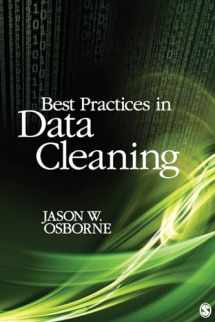
Best Practices in Data Cleaning: A Complete Guide to Everything You Need to Do Before and After Collecting Your Data
Book details
Summary
Description
Many researchers jump from data collection directly into testing hypothesis without realizing these tests can go profoundly wrong without clean data. This book provides a clear, accessible, step-by-step process of important best practices in preparing for data collection, testing assumptions, and examining and cleaning data in order to decrease error rates and increase both the power and replicability of results.
Jason W. Osborne, author of the handbook Best Practices in Quantitative Methods (SAGE, 2008) provides easily-implemented suggestions that are evidence-based and will motivate change in practice by empirically demonstrating―for each topic―the benefits of following best practices and the potential consequences of not following these guidelines.


We would LOVE it if you could help us and other readers by reviewing the book
Book review



